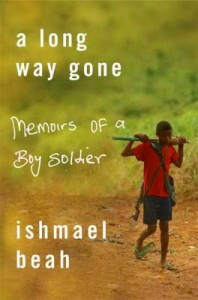 Ishmael Beah, 12 years old, lives in a small Sierra Leone village in West Africa with his father, step-mother and brothers. He loves hip-hop music and, with his secondary-school friends, goes to a neighboring village to show off their dance skills in a talent show. While they are away, anti-government rebels attack their village, causing the villagers to run for their lives, scattering in all directions.
Ishmael Beah, 12 years old, lives in a small Sierra Leone village in West Africa with his father, step-mother and brothers. He loves hip-hop music and, with his secondary-school friends, goes to a neighboring village to show off their dance skills in a talent show. While they are away, anti-government rebels attack their village, causing the villagers to run for their lives, scattering in all directions.
Ishmael and his friends attempt to find their families, but as the war rages, they are forced into hiding. As the boys get deeper into unfamiliar territory, their situation becomes more desperate. They forage for food, sleep where they can, and continue to look for their families. Occasionally they come to other villages, but are met with suspicion or hostility when the people accuse them of being boy soldiers. In some instances the rebels have already ravaged the village and the boys find dead bodies. They witness ghastly scenes where villagers have been tortured and left to die.
Ishmael and his friends, desperate, hungry and homesick, come to a village occupied by the government army. Finally, they feel safe, are given food and a sheltered place to sleep. The boys are manipulated into becoming soldiers, issued clothes, shoes, and guns. They receive training and learn how to kill.
At first Ishmael believes they are fighting for the “good side,” the ones who did not kill their families, but soon, caught up in the madness of war, it becomes hard to discern the good guys from the bad guys.
A Long Way Gone by Ishmael Beah is told with arresting and vivid detail. Having lived in Africa for two years with the Peace Corps, I found the book especially interesting. In Gambia, we experienced an attempted coup and 118 of us expatriates sought shelter in a house for eight days. I well remember the feeling of helplessness and dread. But our experiences were nothing compared to Ishmael’s. His journey is a stark reminder of the horrors of war and its resultant life-changing effects. Not everyone would enjoy this book, but I feel it is a well-written, heartrending account of actual events. I can’t say I enjoyed the book as much as I was intrigued with the honest writing of gut-wrenching experiences, and the realization of what mere children, boy soldiers, are experiencing in war-torn African countries.


Great review of an important book.
Thank you, Carol. It was a book club selection; otherwise, I might have missed it.
I would think that PTS would be rampant among those children caught up in the horrors of war, and probably it is a life-long condition for many. I will put that book on my list, for although as you say, it is not one to be enjoyed, it is one to read, if for no other reason than to remind us of our good fortune to be citizens of a world not fought on our home turf, at least not yet, if we don’t count the battle between the Republicans and Democrats. 🙂
Eunice, while I was reading this book, I often thought of so many of today’s teens and sub-teens here in the U.S. and their feelings of entitlement. It would really be a good book for teens to read.
Teens and all of us have many feelings of entitlement. Learning about the rest of the world is so important.
It IS important, at any age.